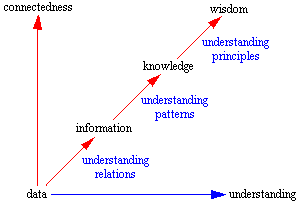What is information?
Data... data is raw. It simply exists and has no significance beyond its existence (in and of itself). It can exist in any form, usable or not. It does not have meaning of itself. In computer parlance, a spreadsheet generally starts out by holding data.
Personally I contend that the sequence is a bit less involved than described by Ackoff. The following diagram represents the transitions from data, to information, to knowledge, and finally to wisdom, and it is understanding that support the transition from each stage to the next. Understanding is not a separate level of its own.
Good and poor information
- Relevant: information must fulfill the needs of the user.
- Timely: information must be available when needed.
- Accurate and complete: All available information should be in right information.
- Concise: Information must be understandable to those who use it.
- Reduces uncertainly: Good information should meet userrequirements completely.
What is poor information?
- Irrelevant: when the information is too old or out-of-date.
- Swamping: it is not helpful when the information is too voluminous.
- Unclear: Information is poor when it is not presented in a way that will facilitate a decision.
- Not all threw: if information is incomplete, it may fail to provide a clear sense of the entirely of the problem.
Sources of Information
Primary: This is the level at which the information is generated,making a scientific discovery, collecting data, recording and oral interview.
Secondary: it comments on events, discoveries, text books, encyclopedias, yearbooks, commentaries and articles in a serial.
Tertiary: Used to track exiting information, index and abstract, catalogues, bibliographies.
Information Literate
In order to use information effectively, it is important to become information literate. Information-literate people know how to find organize, evaluate and use information effectively to solve a particular problem or make a decision.
Information literacy involves knowing:
Which information is available?
Where it might be?
How it can be located and searched?
How it can be retrieved and stored?
How it can be processed and presented?
Information Overload:
Stress induced by reception of more information than is necessary to make a decision (or that can be understood and digested in the time available)and by attempts to deal with it with outdated time management practices
Users of Information:
There are many kinds of information users in the modern word, not just personal users. They include users in...
- Business and industry
- Education
- Research and development
- Entertainment
What is mind map?
A mind map is a diagram used to represent word, ideas, tasks, or other items linked to and arranged around a central key word or idea. Mind maps are used to generate, structure, and classify ideas, and as an aid to studying and organizing information, solving problems, making decisions, and writing.The elements of a given mind map are arranged intuitively according to the importance of the concepts, and are classified into groupings, branches, or areas, with the goal of representing semantic or other connections between portions of information. Mind maps may also aid recall of existing memories.
Reference
- http://www.scribd.com/doc/41269424/Define-Good-Information-2.
- http://en.wikipedia.org/wiki/Information_source


ไม่มีความคิดเห็น:
แสดงความคิดเห็น